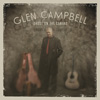GLEN CAMPBELL : GHOST ON THE CANVAS
- A Better Place
- Ghost On The Canvas
- The Billstown Crossroads
- A Thousand Lifetimes
- It's Your Amazing Grace
- Second Street North
- In My Arms
- May 21st, 1969
- Nothing But The Whole Wide World
- Wild And Waste
- Hold On Hope
- Valley Of The Son
- Any Trouble
- Strong
- The Rest Is Silence
- There's No Me.... Without You
Label : The Record Company
Released : August 30th, 2011
Length : 42:02
Review (AllMusic) : Few artists get the luxury of crafting their final album as a conscious farewell, but Glen Campbell isn't just any artist. Campbell is a titan with a legacy that begins before he started to record solo albums, so if anyone deserves to craft a career-capping final record it is he, even if this opportunity is bittersweet, tainted by the knowledge that he was diagnosed with Alzheimer's sometime during its recording. His disease does hang over Ghost on the Canvas, its sadness surfacing on the instrumental interstitials written by Roger Manning, but this album bears none of the ghoulish fetishization of death that haunts Rick Rubin's latter-day productions of Johnny Cash. No, producer Julian Raymond has crafted Ghost on the Canvas as a specific sequel to the very good 2008 Meet Glen Campbell, which consciously re-created Campbell's golden decade of 1967-1977 through newly written songs and covers of modern rockers. Raymond uses the same formula here, finding tunes by Manning, Paul Westerberg (the title track), Jakob Dylan ("Nothing But the Whole Wide World"), Robert Pollard ("Hold on Hope"), and Teddy Thompson ("In My Arms"), then crafting sturdy originals with Campbell, all evoking such luxuriant dramatic classics as "Wichita Lineman" without succumbing under self-conscious weight. It's a delicate trick that, apart from those too elegiac instrumentals, never once seems forced, a testament to Raymond's skills as a producer and Campbell's as a musician and singer. Perhaps Ghost on the Canvas doesn't revisit every high in Campbell's history, but it pays honor to his legacy and feels like an appropriate and subtly moving farewell.
